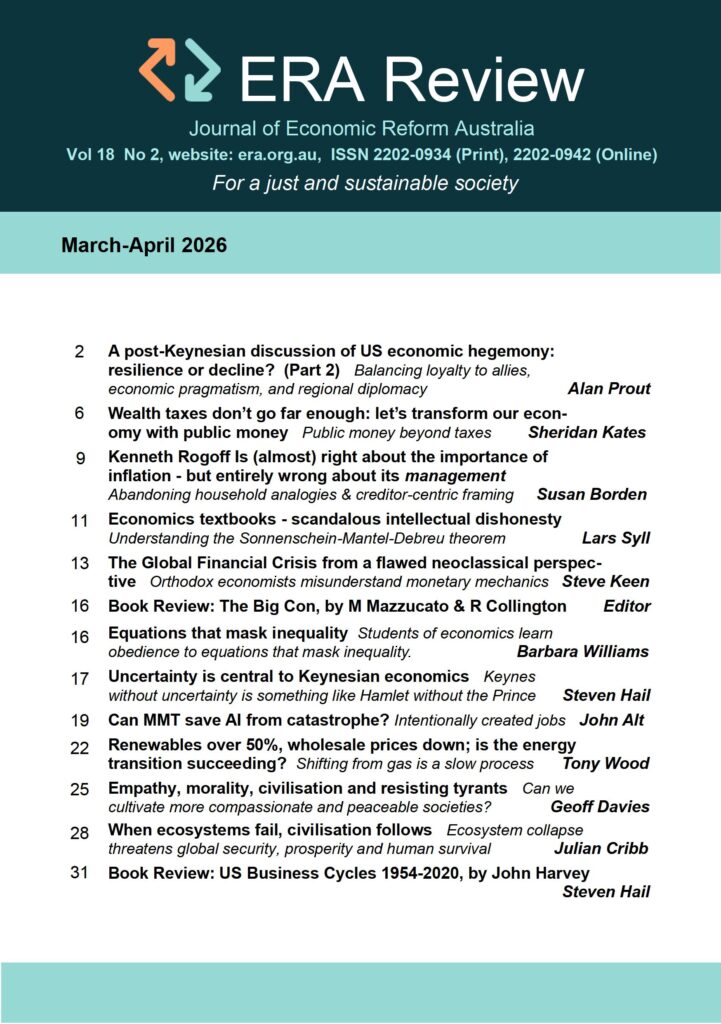Sack the economists? – Geoff Davies
Readers of Steve Keen’s blog will have encountered the idea that near- equilibrium neoclassical economic theory is irrelevant to dynamic, far-from- equilibrium, real modern economies, and that the body of theory built around the neoclassical assumptions is full of inconsistencies. You will also be familiar with the idea that money and debt play central, dynamic roles in modern economies.
Yet it can be argued there are other equally fundamental flaws in the broader stream of theory and practice that might be called mainstream economics. Some examples, very briefly: so-called national accounting implicitly promotes many harmful activities; modern financial mar- kets are predominantly parasitic, destabilising and destructive; the emergent, collective wealth of proximate enterprises is overlooked, and hence usually captured by speculators; flows of wealth, and responsibility, are heavily dependent on the kinds of ownership that are used, yet the full range of available ownership options is largely ignored; and there are many identifiable mechanisms that pro- mote unjustified wealth inequality but that could readily be adjusted to promote more equitable rewards for effort.
Perhaps the most fundamental, destabilising and overlooked flaw in our strange economic system is the practice of issuing new money to finance investment. It is arguably the main reason why a crash on Wall Street (the centre of financial manipulation) causes such havoc on Main Street (the productive economy). Indeed few ever seem to wonder why the failure of some people’s “investments” should cause harm throughout the rest of the economy, rather than just to the par- ties involved with the investments.
Because of all of these fundamental deficiencies, I can only describe neoclassical economics as pseudo-science, or even as pre-scientific — myths unconstrained by any contact with reality. Its practitioners seem to think that because it uses a lot of mathematics it is science, but it only superficially resembles science, it does not critically compare its prognostications with observations of the real world. When that is done its irrelevance is manifest, market crashes being one of the obvious discriminators.
Unfortunately this absurd collection of beliefs is not just an interesting anthropological phenomenon, because the application of mainstream economics has created a pathologically unstable, inequitable, destructive and fragile industrial society.
Most critics may not be quite as damning as I am here, but there is, these days, a lot of questioning of mainstream economics, because of its almost complete failure to anticipate the financial crash of 2007– 8, even though others were issuing credible warnings from 2005 or even earlier.
Worse, mainstream economics created the conditions that led to the crash, and still appeals to the same old concepts in its futile attempts to ameliorate the result- ing depression. Indeed it is widely noted outside the mainstream that neoliberal policies are making things worse, particularly and most obviously in Europe.
Yet the mainstream profession sails serenely on, still firmly in control of both policy and academia, acknowledging very little concern with its theory and methods, indeed insisting that the financial crash was so anomalous nobody could have foreseen it. This is a plain admission that they do not understand modern econ- omies. Like all the other proofs of its inadequacy, this implication is ignored by the mainstream, to the great frustration of many on the fringe.
One expression of this frustration came from Dean Baker, the prominent US commentator who, after railing against the “deficit hawks” and calling them flat-earthers, said “By all rights, these folks should be laughed out of town. They should be retrained for a job more suited to their skill set – preferably something that doesn’t involve numbers, or people.”
Reading this, it occurred to me that all subtlety must be abandoned. The mes- sage could only ever penetrate the wall of deafness if it was spelt out in brutal sim- plicity. The mainstreamers should be laughed out of town. They should be removed from all positions of influence.
They should be sacked. They should not be allowed to propagate their baleful doctrine. Hence the title and subject of my new ebook: Sack the Economists and Disband Their Departments.
The title is not subtle, but it is justifiable. Nor is the content a rant, it is a concise summary of major fundamental flaws in the theory and practice of mainstream economics. It also outlines the insights that follow from recognising modern economies as far-from-equilibrium self- organising systems. These insights include the clear potential to reform our market economies so they support people as whole beings, and so they cease to trash the only planet we have to live on.
Not all non-mainstream economists will agree with everything in this book. Yet there are some who do agree with each criticism made. Not all will immediately agree with all the diagnoses made, nor all the remedies proposed.
Nevertheless the subject, and the world, desperately needs real debate on the workings of real economies, conducted with full scholarly rigour and integrity.
All non-mainstream economists, and all scholars from all relevant disciplines (which is most) should be able to support that goal.
Source: Steve Keen’s blog: http://www.debtdeflation.com/blogs/2013/12/07/sack-the-economists/

Dr Geoff Davies is an author, commentator and scientist. Sack the Economists is now available as an ebook.































